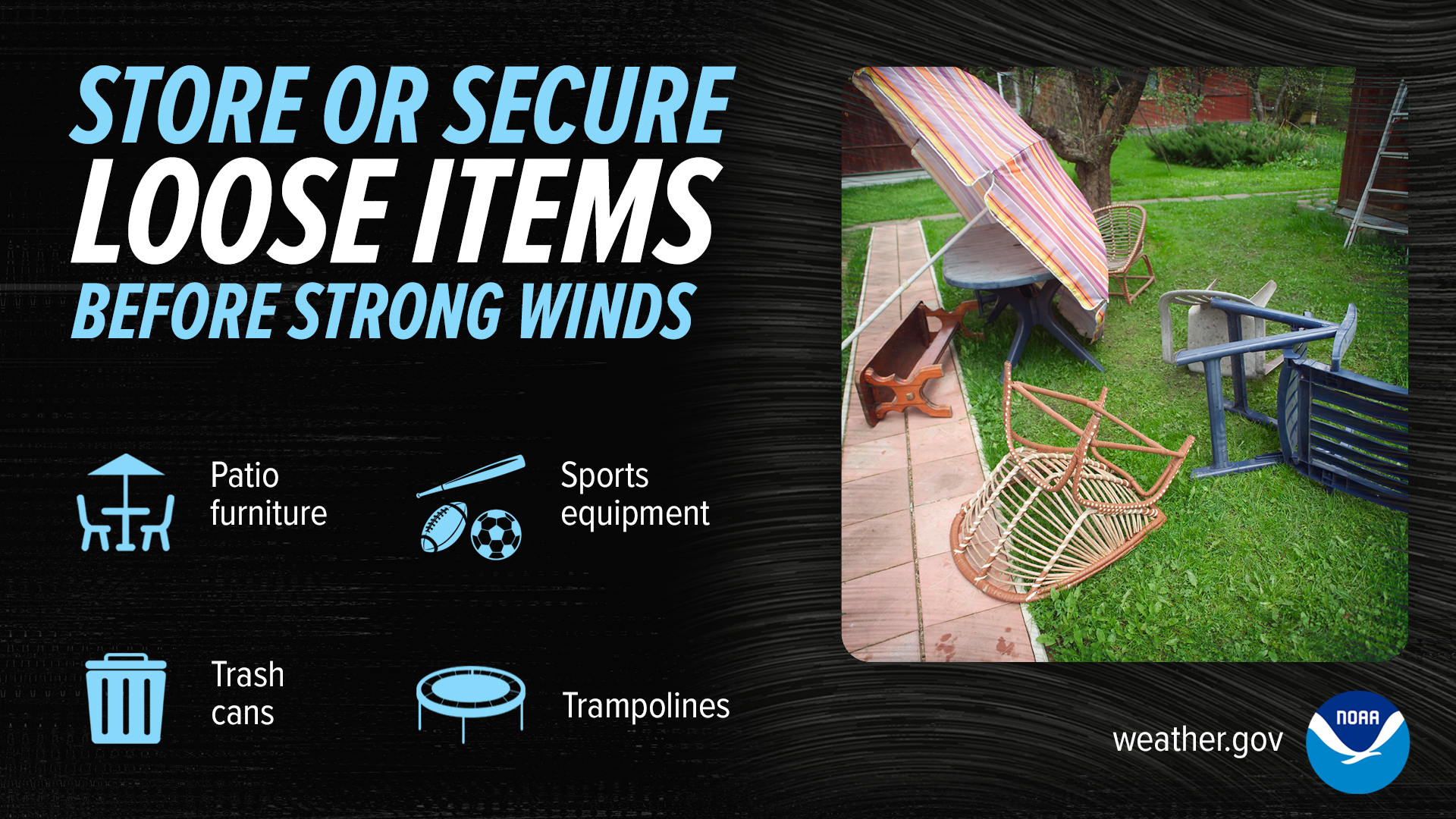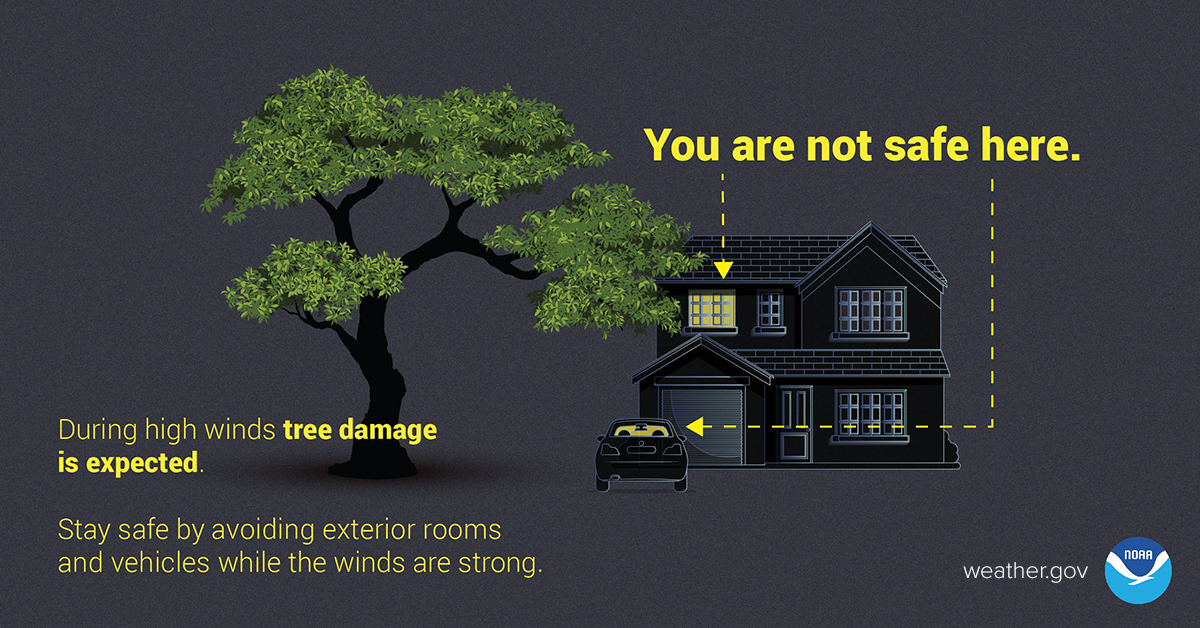Please help the National Weather Service spread these important safety messages on social media! Everyone is welcome to use the text and images provided below to help the NWS build a Weather-Ready Nation.
Facebook
High winds can make driving dangerous. If driving during windy conditions, slow down and keep two hands on the wheel, avoid large trucks and trailers, and watch for downed tree branches, trees and power lines. Bridges and overpasses can be particularly dangerous to drive over when it is extremely windy, so choose routes to avoid them.
weather.gov/safety/wind-during
Twitter
If driving during windy conditions, slow down, avoid large trucks and trailers, and watch for downed tree branches and power lines. Bridges and overpasses can be particularly dangerous, avoid them if you can.
weather.gov/safety/wind-during #WeatherReady

Facebook
Wind can be dangerous for those out on the water because strong winds create large waves and can damage your boat, push you off course, or even cause you to capsize. If high winds are forecast, stay off the water and stow your vessel before conditions become hazardous. weather.gov/safety/safeboating
Twitter
Wind can be dangerous when out on the water because strong winds can create large waves. If high winds are forecast, adjust your plans. weather.gov/safety/safeboating #WeatherReady

Facebook
Strong storms with whipping winds commonly impact the U.S. during the cooler months. Each year, there are reports of trees and powerlines that have been knocked over and homes that have been damaged. Trim trees and shrubs and repair loose siding or shutters around your home well in advance of a storm. This can help reduce damage to your home. weather.gov/safety/wind-before
Twitter
Before it gets windy, prepare your home! Trim trees and repair loose siding and shutters. weather.gov/safety/wind-before #WeatherReady

Facebook
Even the most common items become dangerous objects when picked up and carried by the wind! When a High Wind Watch or a Severe Thunderstorm Watch is issued, secure outdoor items such as patio furniture, sports equipment and trash cans. weather.gov/safety/wind-during
Twitter
Even the most common items become dangerous objects when picked up and carried by the wind! weather.gov/safety/wind-during #WeatherReady

Facebook
Recreational vehicles and trailers/campers are NOT a safe shelter from strong winds. Wind gusts can turn them over whether parked or in motion. If high winds are forecast, consider rescheduling your trip. weather.gov
Twitter
Recreational vehicles and trailers/campers are NOT a safe shelter from strong winds. Wind gusts can turn them over whether parked or in motion. If high winds are forecast, consider rescheduling your trip. weather.gov #WeatherReady

Facebook
Driving in a dust storm is dangerous. Not only can they severely limit your visibility, but they can materialize very quickly. Learn more at weather.gov/safety/wind-dust-storm
Twitter
Driving in a dust storm is dangerous. Not only can they severely limit your visibility, but they can materialize very quickly. Learn more at weather.gov/safety/wind-dust-storm. #WeatherReady

Facebook
A High Wind WATCH means Be Prepared.
A High Wind WARNING means Take Action!
weather.gov/safety/wind-ww
Twitter
A High Wind WATCH means Be Prepared.
A High Wind WARNING means Take Action!
weather.gov/safety/wind-ww #WeatherReady

Facebook
During high winds, falling trees and broken branches can become dangerous objects. Stay safe by avoiding exterior rooms and windows and by using caution when driving. Prevent damage to your property by trimming loose branches and parking away from trees. weather.gov/safety/wind
Twitter
During high winds, trees can become dangerous objects. Stay safe by avoiding exterior rooms and windows and by using caution when driving. Prevent damage to your property by trimming loose branches and parking away from trees. weather.gov/safety/wind #WeatherReady

Facebook
During strong thunderstorms, straight line wind speeds can exceed 100 mph and can cause damage similar to a tornado, knocking over semi-trucks, trees, and powerlines. Stay indoors and away from windows. If caught on the road during straight line winds, slow down and keep two hands on the wheel. weather.gov/safety/wind
Twitter
During strong thunderstorms, straight line wind speeds can exceed 100 mph and can cause damage similar to a tornado, knocking over semi-trucks, trees, and powerlines. Stay indoors and away from windows. weather.gov/safety/wind #WeatherReady

Facebook
Clear isn’t always calm. Even on a clear day, strong winds can be dangerous. Objects that are not secured can be rolled or tossed. Use caution when driving, especially high-profile vehicles. weather.gov/safety/wind
Twitter
Clear isn’t always calm. Even on a clear day, strong winds can be dangerous. Objects that are not secured can be rolled or tossed. Use caution when driving, especially high-profile vehicles. weather.gov/safety/wind #WeatherReady

Facebook
Do you ever wonder why the leeward slopes of mountains and hills can have bursts of warm, gusty winds at times? These are downslope winds. They’re caused by strong winds that move over a ridge. As the air descends and accelerates, it’s compressed and warmed. Sometimes, damaging winds can result, along with a rise in temperatures.
Twitter
Downslope winds can cause damaging gusts and warming temperatures on the leeward slopes of mountains and hills. Don’t let sudden gusts in seemingly calm weather catch you off-guard! #WeatherReady

Facebook
Wind is a part of weather we experience all the time, but why does it actually happen? This video covers the basics: youtu.be/kb9oRYUzlwQ
Twitter
Wind is a part of weather we experience all the time, but why does it actually happen? This video covers the basics: youtu.be/kb9oRYUzlwQ
Facebook
High winds can be dangerous! If possible, stay inside. When driving, slow down, keep both hands on the wheel, and keep away from high-profile vehicles. Be aware of loose outdoor items and stay clear of trees. Visit weather.gov/wind for more information.
Twitter
High winds can be dangerous! When driving, slow down and keep away from high-profile vehicles. Be aware of loose outdoor items and stay clear of trees. weather.gov/wind #WeatherReady

Facebook
Santa Ana winds are strong downslope winds that blow through the mountain passes in Southern California. They are created over the Great Basin region from high-pressure air masses, which then blow down towards sea level. These winds, which can easily exceed 40 miles per hour, are warm and dry, and can severely exacerbate brush or forest fires, especially under drought conditions. For more info, visit weather.gov/safety/wind-mountain-valley.
Twitter
Santa Ana winds are strong downslope winds that blow through the mountain passes in Southern California. The winds can easily exceed 40 MPH, are warm and dry, and can severely exacerbate brush or forest fires, especially under drought conditions. weather.gov/safety/wind-mountain-valley.

Facebook
With little to no wind, your body is able to maintain a thin layer of warmer air between your skin and colder air surrounding you. However, higher winds can eliminate that thin layer, and your body can begin to cool at a dangerously fast rate. Visit weather.gov/safety/cold for more winter science!
Twitter
With little to no wind, your body can maintain a thin layer of warmer air between your skin and colder air surrounding you. Higher winds can eliminate that thin layer, and your body can begin to cool at a dangerously fast rate. weather.gov/safety/cold #WinterScience

Facebook
Powerful storms can pack a windy punch. Don’t wait until you’re in the dark! Check your emergency kit now to ensure you have plenty of batteries and other essential supplies on hand. ready.gov/kit
Twitter
Powerful storms can pack a windy punch, knocking out power. Are you ready? ready.gov/kit #WeatherReady

Facebook
Your family may not be together when a disaster strikes, so it is important to plan in advance: how you’ll get to a safe place, how you'll contact one another, how you’ll get back together, and what you’ll do in different situations. Create a Family Communications Plan. http://www.ready.gov/make-a-plan
Twitter
Your family may not be together when a disaster strikes. Make a plan. http://www.ready.gov/make-a-plan #WeatherReady
